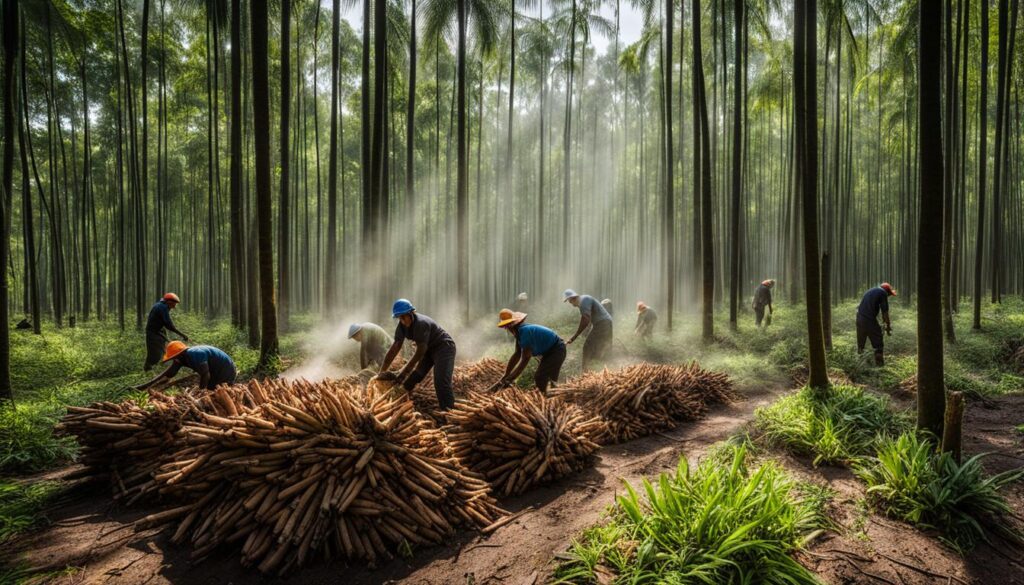Tongkat Ali, also known as Eurycoma Longifolia, is a powerful root that has gained popularity for its potential health benefits. However, it is important to consider the sustainability and environmental impact of harvesting Tongkat Ali. In this article, I will explore the importance of sustainable Tongkat Ali harvesting practices and how it contributes to preserving nature for future generations. We will also discuss the benefits of choosing organic, ethically sourced, and eco-friendly Tongkat Ali products.
Key Takeaways:
- Sustainable Tongkat Ali is harvested with the environment in mind, ensuring the preservation of nature.
- Choosing organic, ethically sourced, and eco-friendly Tongkat Ali products supports sustainable practices.
- Fair trade Tongkat Ali promotes fair working conditions for communities involved in its harvesting and manufacturing.
- Responsible harvesting and manufacturing practices are essential for the long-term availability of Tongkat Ali.
- By opting for sustainable Tongkat Ali, consumers can enjoy the benefits of this herbal supplement while supporting environmental conservation.
Malaysia: The Best Country for Authentic Tongkat Ali
When it comes to sourcing authentic Tongkat Ali, Malaysia stands as the premier destination. With its exceptional biodiversity and 130 million-year-old rainforests, Malaysia provides the perfect ecosystem for high-quality Tongkat Ali plants to thrive and flourish. This natural environment contributes to the potent and effective properties of Malaysian Tongkat Ali.
Malaysia has also pioneered the production of patented freeze-dried extraction technology for Tongkat Ali, ensuring better quality and higher potency. This innovative extraction process allows for maximum preservation of the root’s bioactive compounds, resulting in superior herbal supplements. The use of these advanced extraction technologies sets Malaysian Tongkat Ali apart from the rest.
The government of Malaysia has been actively promoting and supporting the commercialization and research development of Tongkat Ali, leading to the publication of the Tongkat Ali standard known as MS 2409. This standard guarantees the best potency, efficacy, and safety of Malaysian Tongkat Ali products. Government-funded initiatives in Malaysia focus on sustainable harvesting practices, ensuring that Tongkat Ali is sourced ethically and responsibly.
By choosing Malaysian Tongkat Ali, consumers can have confidence in the authenticity and quality of the herbal supplement. The combination of Malaysia’s natural environment, advanced extraction technologies, and government regulations make it the ideal country for sourcing sustainable, organic, ethically sourced, and eco-friendly Tongkat Ali products.
The Benefits of Malaysian Tongkat Ali over Indonesian Tongkat Ali
When it comes to sourcing Tongkat Ali, Malaysia has a distinct advantage over Indonesia. The soil quality in Malaysia is known to produce Tongkat Ali plants with higher concentrations of bioactive ingredients compared to their Indonesian counterparts. This translates to a higher potency and efficacy in Malaysian Tongkat Ali products, making them a preferred choice for individuals seeking the full benefits of this powerful herb.
Furthermore, Malaysia’s rich biodiversity and remote locations contribute to Tongkat Ali plants that are free from contamination and pollutants. The country’s commitment to preserving its rainforests ensures that Malaysian Tongkat Ali is harvested in an environment that is as natural and pristine as possible. In contrast, Indonesian Tongkat Ali may be subject to a higher risk of exposure to pollutants, which can potentially affect the quality and safety of the product.
When it comes to harvesting techniques and quality standards, Malaysia also sets a higher benchmark. The Malaysian government has implemented strict regulations and standards for the Tongkat Ali industry, ensuring that responsible and sustainable practices are followed. Handpicking the roots of Tongkat Ali by experienced artisans minimizes damage to the rainforests and reduces the impact on the environment. Since the demand for Tongkat Ali has been increasing, it is crucial to prioritize sustainable harvesting methods to protect the longevity and availability of this valuable herb.
The Importance of Responsible Harvesting and Manufacturing Practices
Responsible harvesting and manufacturing practices are paramount when it comes to sustainable tongkat ali production. By prioritizing eco-conscious methods, we ensure that the environmental impact is minimized while preserving the long-term availability of this powerful herbal supplement. Let’s take a closer look at the key aspects that make responsible harvesting and manufacturing practices essential.
Responsible Harvesting: Handpicked Roots and Conservation Efforts
One of the fundamental principles of responsible tongkat ali harvesting is the use of manual techniques to handpick the roots. Experienced artisans meticulously select mature plants, leaving younger ones to grow and regenerate. This method minimizes damage to the rainforests, allowing the ecosystem to thrive. Additionally, sustainable harvesting practices involve collaboration with indigenous communities, such as the Orang Asli, who have invaluable knowledge of the rainforest’s resources. Through these partnerships, we ensure that harvesting methods are environmentally friendly and promote conservation efforts.
Standardized Extraction Technology: Ensuring Quality and Potency
Responsible manufacturing practices also encompass the use of standardized extraction technology. By employing innovative and patented formulations, such as Physta®, we guarantee the highest level of potency and maximum absorption of the bioactive compounds found in tongkat ali. This ensures that consumers receive the full benefits of this remarkable root while minimizing waste. With standardized extraction technology, we can maintain the quality and efficacy of tongkat ali products, meeting the demands of eco-conscious consumers.

Commitment to Sustainability: Supporting the Environment and Local Communities
Responsible harvesting and manufacturing practices go hand in hand with sustainability efforts. Malaysia, as a leader in the tongkat ali industry, has implemented zero-deforestation policies to prevent environmental degradation. It is also committed to replanting three new tongkat ali plants for every one harvested, ensuring the continuous growth of this valuable herb. Furthermore, by supporting local communities through fair trade initiatives, we contribute to the economic well-being of indigenous groups and promote social sustainability.
| Benefits of Responsible Harvesting and Manufacturing Practices: | Impacts of Irresponsible Practices: |
|---|---|
|
|
By choosing responsibly harvested tongkat ali products, consumers play a crucial role in supporting sustainable practices. Together, we can preserve the natural environment, promote the well-being of local communities, and enjoy the benefits of this exceptional herbal supplement for years to come.
Regulation and Enforcement in the Malaysian Tongkat Ali Industry
The Malaysian government plays a crucial role in regulating and enforcing the Tongkat Ali industry to ensure the authenticity and safety of products. By implementing strict rules and regulations, they strive to protect consumers and maintain the integrity of the market.
Illegal sourcing and smuggling of raw Tongkat Ali from Malaysia are strictly prohibited. Those caught engaging in such activities face legal consequences, emphasizing the government’s commitment to tackling illicit practices. Health authorities in Malaysia actively monitor and regulate the market to prevent the sale of illegal, fake, and counterfeit Tongkat Ali products.
The Malaysian Standards MS2409 have been established to set quality standards for the extraction process and manufacturing practices of Tongkat Ali products. These standards include safety measures for microbial load and heavy metal content, ensuring that consumers can trust the quality and safety of the products they purchase.
By enforcing these regulations, the Malaysian government ensures that the Tongkat Ali industry operates within a framework that prioritizes consumer safety and provides genuine, high-quality products.
Table: Legal Status of Tongkat Ali in Malaysia
| Type of Product | Legal Status |
|---|---|
| Tongkat Ali Extract | Legal for commercialization |
| Raw Tongkat Ali | Illegal for export |
| Tongkat Ali Supplements | Regulated under Malaysian Standards MS2409 |

Sustainable Harvesting Practices in Malaysia
When it comes to sustainable Tongkat Ali harvesting, Malaysia leads the way with its environmentally friendly practices. A key aspect of sustainability is the collaboration with the indigenous community known as Orang Asli, who have a deep understanding of the rainforest and its resources. By working together, the industry ensures that harvesting practices are conducted in a responsible manner, minimizing the impact on the delicate ecosystem.
Green harvesting techniques are employed, which involve the careful handpicking of Tongkat Ali roots using traditional tools. This manual approach allows for selective harvesting, ensuring that only mature roots are taken while leaving younger ones to grow and replenish the population. By replacing each harvested plant with three new ones, the industry supports the long-term sustainability of Tongkat Ali and contributes to conservation efforts.
The collaboration with the indigenous community not only promotes ecological balance but also provides economic opportunities for the Orang Asli people. Through fair trade practices, these partnerships ensure that the benefits of Tongkat Ali cultivation are shared with the local communities, fostering social and economic development in the region.
“Sustainability is at the heart of our harvesting practices. By working hand in hand with the indigenous community, we are able to protect the rainforest while ensuring the long-term availability of high-quality Tongkat Ali,” says Dr. Tan, a renowned expert in the field.

The Environmental Impact of Sustainable Harvesting
The environmentally friendly practices employed in Malaysia’s Tongkat Ali industry have a positive impact on the rainforest ecosystem. By handpicking the roots, the industry minimizes damage to the surrounding vegetation and wildlife habitats. This approach also reduces the need for heavy machinery that can cause soil erosion and disrupt the natural balance of the rainforest.
In addition to sustainable harvesting, the industry places great emphasis on conservation efforts. The replanting of three new Tongkat Ali plants for every harvested one helps maintain the biodiversity of the rainforest and ensures the long-term survival of this precious herb. By preserving the rainforest, sustainable harvesting practices also protect the habitats of countless other plant and animal species, contributing to the overall health and balance of the ecosystem.
Summary
Sustainable Tongkat Ali harvesting in Malaysia goes beyond just protecting the environment. It is a collaborative effort between the industry and the indigenous community, promoting ecological balance and supporting the local economy. By employing green harvesting techniques and replanting policies, the industry ensures the long-term availability of Tongkat Ali while preserving the rainforest for future generations to enjoy.
Tongkat Ali and Its Exciting Potential for Health Benefits
Tongkat Ali, also known as Eurycoma Longifolia, has gained recognition for its potential health benefits, particularly in relation to the endocrine system. This powerful root has been studied for its ability to increase testosterone production, which plays a crucial role in maintaining hormonal balance. By supporting healthy testosterone levels, Tongkat Ali may have a positive impact on mood, libido, muscle growth, and body fat reduction.
The bioactive compounds found in Tongkat Ali, such as eurycomanone, glycosaponin, and crude proteins, contribute to its therapeutic properties. These compounds have been linked to improved physical performance, enhanced vitality, and increased energy levels. As a result, Tongkat Ali is often sought after as a natural supplement for individuals looking to boost their overall well-being.
Tongkat Ali’s natural anti-aging properties make it a valuable addition to any wellness routine. Its antioxidant and anti-inflammatory effects may help reduce the signs of aging and support cellular health. By incorporating Tongkat Ali into a comprehensive health regimen, individuals can take proactive steps towards maintaining their youthfulness and vitality as they age.
With its exciting potential for health benefits, Tongkat Ali has become a popular choice among those seeking natural ways to support their well-being. Whether looking to enhance performance, improve hormonal balance, or slow down the aging process, Tongkat Ali offers a promising solution backed by science and tradition.
Table: Potential Health Benefits of Tongkat Ali
| Health Benefit | Description |
|---|---|
| Increase Testosterone Production | Tongkat Ali may support healthy testosterone levels, contributing to improved mood, libido, muscle growth, and body fat reduction. |
| Enhanced Vitality | The bioactive compounds in Tongkat Ali have been associated with increased energy levels and improved physical performance. |
| Anti-Aging Properties | Tongkat Ali’s antioxidant and anti-inflammatory effects may help reduce the signs of aging and support cellular health. |
Conclusion
Sustainable Tongkat Ali harvesting is essential for preserving the natural ecosystem and ensuring the long-term availability of this potent herbal supplement. Malaysia stands out as the best country for sourcing authentic and high-quality Tongkat Ali, thanks to its exceptional biodiversity, harvesting techniques, and commitment to responsible manufacturing processes.
By choosing sustainable and eco-friendly Tongkat Ali products, consumers can experience the power of this remarkable root while supporting the conservation of nature for future generations. Malaysia’s dedication to ethical sourcing and environmentally conscious practices sets a strong example for the industry, ensuring that Tongkat Ali remains available without compromising the delicate balance of the rainforest ecosystem.
As the demand for Tongkat Ali continues to grow, it is crucial to prioritize sustainable practices to protect the environment and maintain the integrity of the Tongkat Ali plants. By opting for products that are responsibly harvested, consumers can contribute to the preservation of biodiversity and the long-term sustainability of this valuable herbal supplement.
